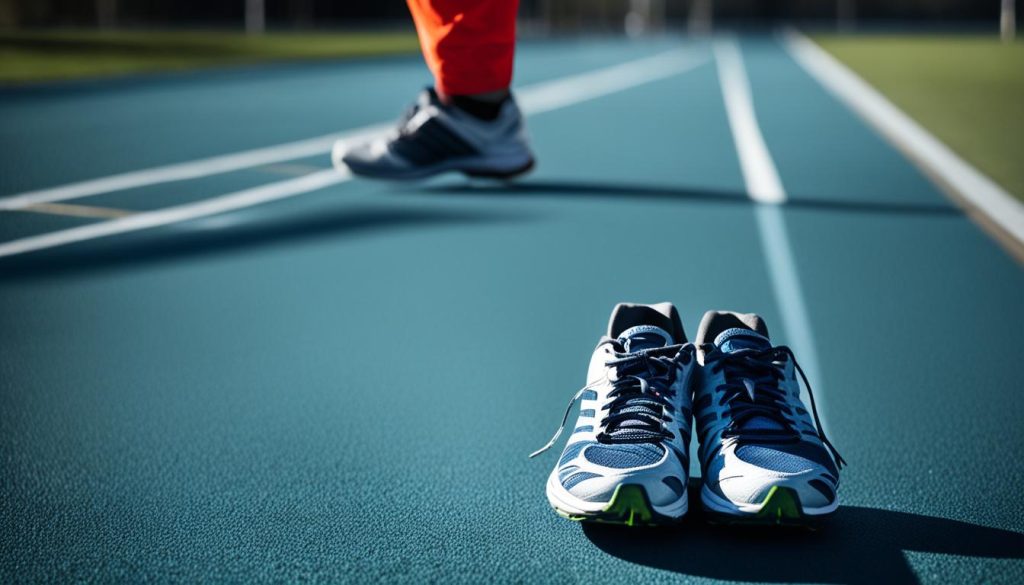Welcome to our insightful article on innovative sports injury prevention techniques for athletes who aspire to achieve peak performance. As athletes, it is crucial to prioritize injury prevention to ensure long-term success and maintain optimal physical and mental health. In this section, we will explore various techniques that have proven effective in the world of sports.
From professional athletes to weekend warriors, everyone can benefit from incorporating innovative sports injury prevention techniques into their routine. By implementing these strategies, athletes can not only enhance their performance but also reduce the risk of injuries that may hinder their progress.
Key Takeaways:
- By prioritizing injury prevention, athletes can maintain peak performance in their respective sports.
- Incorporating innovative techniques such as adequate sleep and proper nutrition can optimize athletic performance.
- Getting injuries treated promptly and seeking professional medical attention is crucial for long-term performance and longevity.
- Rest days and engaging in outdoor cardio exercises play a significant role in preventing overexertion and maximizing performance.
- Successful athletes understand the importance of continuous learning and implementing innovative sports injury prevention techniques.
The Importance of Sleep for Athletes’ Performance and Injury Prevention
Adequate sleep is crucial for athletes to recover from demanding workouts and perform at their best. Quality sleep plays a significant role in optimizing athletic performance and preventing injuries. By prioritizing proper sleep, athletes can enhance their performance and reduce the risk of injuries. Here, we will explore the recommended amount of sleep for athletes, the benefits of sleep for muscle recovery, and the role of sleep in physical and mental performance.
The Recommended Amount of Sleep for Athletes
Getting enough sleep is essential for athletes to support their training and performance. Studies suggest that athletes should aim for 7-9 hours of sleep per night to optimize recovery and maximize their potential on the field or court. Sleep deprivation can lead to reduced reaction time, decreased focus, and impaired decision-making abilities, which can negatively impact an athlete’s performance.
The Benefits of Sleep for Muscle Recovery
During sleep, the body undergoes essential processes that promote muscle recovery and growth. While athletes engage in intense physical activities, sleep provides an opportunity for the muscles to repair themselves. During deep sleep stages, human growth hormone (HGH) is released, promoting tissue repair, muscle growth, and overall physical recovery. Thus, quality sleep is crucial for athletes to repair and strengthen their muscles, allowing them to perform at their peak.
The Role of Sleep in Physical and Mental Performance
Sleep plays a crucial role in both physical and mental performance for athletes. Lack of sleep can lead to fatigue, decreased energy levels, and compromised cognitive functions. Adequate sleep helps improve mental clarity, reaction time, decision-making abilities, and concentration, all of which are essential for athletic performance. Additionally, sleep contributes to enhanced immune function and injury prevention, reducing the risk of both acute and overuse injuries.
By recognizing the importance of sleep in athletes’ lives, they can prioritize and optimize their sleep patterns to promote peak performance while reducing the risk of injuries. Incorporating a consistent sleep schedule, creating a conducive sleep environment, and practicing relaxation techniques can all contribute to better sleep quality for athletes.
By emphasizing quality sleep as an integral part of an athlete’s training regimen, coaches, trainers, and athletes themselves can ultimately unlock their full potential and achieve success in their respective sports.
The Role of Diet and Nutrition in Sports Injury Prevention
A balanced diet is key to providing athletes with the energy they need for workouts, games, and optimal muscle health. Proper nutrition plays a crucial role in preventing sports injuries. By fueling their bodies with the right nutrients, athletes can enhance their performance and reduce the risk of injuries.
When it comes to diet and nutrition for athletes, it’s important to maintain a balanced approach. Achieving the right balance of protein, carbohydrates, unsaturated fats, vitamins, and minerals is essential for overall health and injury prevention. Proteins help with muscle recovery and repair, while carbohydrates provide the necessary energy for physical activities.
Unsaturated fats should also be included in an athlete’s diet as they support cardiovascular health and aid in nutrient absorption. Vitamins and minerals, such as vitamin D, calcium, and iron, contribute to bone health, muscle function, and oxygen transport within the body.
Additionally, staying hydrated is crucial for athletes. Drinking enough water throughout the day helps maintain physical and mental performance. Dehydration can lead to fatigue, muscle cramps, and decreased cognitive function, increasing the risk of injuries.
Proper nutrition is the foundation for optimizing athletic performance and preventing injuries. By maintaining a balanced diet that includes the right nutrients and staying hydrated, athletes can support their muscle health and reduce the likelihood of sports-related injuries.
The Benefits of a Balanced Diet and Hydration for Athletes
Here are some key benefits of a balanced diet and proper hydration for athletes:
- Enhanced performance: A well-balanced diet provides the necessary fuel for athletes to perform at their best. It improves energy levels, endurance, and overall physical performance.
- Improved muscle health: Adequate protein intake supports muscle recovery and growth, reducing the risk of muscle injuries and promoting muscle strength.
- Optimal recovery: Proper nutrition and hydration help with post-workout recovery, allowing athletes to bounce back faster and reduce muscle soreness.
- Strong immune system: Nutrient-rich foods and hydration support a healthy immune system, reducing the susceptibility to illnesses that can hinder training and performance.
- Better focus and concentration: A balanced diet and hydration play a vital role in maintaining cognitive function, improving mental clarity, focus, and decision-making abilities during sports activities.
By prioritizing a balanced diet, proper nutrition, and staying hydrated, athletes can optimize their performance, decrease the risk of injuries, and achieve their athletic goals.
| Nutrient | Food Sources |
|---|---|
| Protein | Lean meat, poultry, fish, eggs, dairy products, legumes, nuts, seeds |
| Carbohydrates | Whole grains, fruits, vegetables, legumes |
| Unsaturated Fats | Olive oil, avocados, nuts, seeds, fatty fish |
| Vitamins | Leafy greens, citrus fruits, berries, nuts |
| Minerals | Dairy products, dark leafy greens, fortified cereals, nuts, seeds |
The Importance of Getting Injuries Treated for Athletes’ Performance and Longevity
Listening to one’s body and getting injuries treated is crucial for athletes’ long-term performance and longevity. When athletes push through an injury without seeking proper treatment, it can have severe consequences on their overall performance and well-being. Proper treatment and healing are essential for optimal performance and reducing the risk of further injuries.
Ignoring injuries not only hinders an athlete’s ability to perform at their best, but it can also lead to long-term damage and chronic conditions that can significantly impact their longevity in their chosen sport. By prioritizing injury recovery and seeking professional medical treatment, athletes can take the necessary steps to recover effectively and perform better in the long run.
It’s important to remember that injuries can have a domino effect on an athlete’s performance. For example, an untreated ankle injury can lead to compensatory movements that may cause strain on different parts of the body, resulting in additional injuries. By addressing injuries promptly, athletes can prevent a cycle of injuries and setbacks that hinder their progress and potential.
In order to optimize rehabilitation and recovery, athletes should consult with sports medicine professionals who specialize in treating athletic injuries. These experts can provide personalized treatment plans, including physical therapy exercises, rehabilitation techniques, and guidance on proper conditioning and training to prevent future injuries.
The Risks of Working Through an Injury
“Playing through the pain” has been a mantra for many athletes, with the belief that showing toughness and resilience in the face of injuries is a sign of dedication and commitment. However, this mindset can be detrimental to an athlete’s long-term performance and health.
Dr. Emma Thompson, sports medicine specialist, emphasizes, “Working through an injury not only delays the healing process but also increases the risk of exacerbating the injury or developing compensatory movements that can lead to further injuries. It’s essential for athletes to recognize the importance of rest, proper treatment, and rehabilitation to ensure their longevity in their respective sports.”
It’s crucial for athletes to understand that rest and proper medical care are integral parts of the recovery process. Neglecting injuries can prolong the healing time, cause long-lasting damage, and hinder an athlete’s performance potential.
By accepting the importance of getting injuries treated and taking the necessary time to heal, athletes can invest in their long-term performance and longevity. A proactive approach to injury management not only allows athletes to return to their sport more quickly but also sets them up for success in the future.

Table: The Impact of Untreated Injuries on Athletes’ Performance and Longevity
| Consequences of Untreated Injuries | Effects on Performance and Longevity |
|---|---|
| Chronic pain and discomfort | Impaired performance and inability to reach peak potential |
| Compensatory movements and imbalances | Increased risk of further injuries and decreased overall performance |
| Development of chronic conditions | Long-term impact on athletic career and quality of life |
| Decreased confidence and mental well-being | Reduced motivation and potential for success |
Seeking proper treatment for injuries is a vital step in an athlete’s journey towards peak performance and longevity. By addressing injuries promptly and following appropriate rehabilitation protocols, athletes can enhance their performance, prevent long-term damage, and enjoy sustained success in their chosen sports.
The Benefits of Rest Days and Outdoor Cardio for Athletes
Rest days and outdoor cardio play a vital role in enhancing athletes’ performance and overall well-being. In this section, we will delve into the significance of incorporating rest days and outdoor cardio exercises into athletes’ training routines.
The Importance of Rest Days
Rest days are essential for athletes as they provide an opportunity for the body and mind to recover from intense physical activities and reduce the risk of overtraining. Taking regular rest days allows muscles to repair and rebuild, leading to improved performance and muscle growth. In addition, rest days help prevent fatigue, burnout, and injuries that can hinder an athlete’s progress. A well-rested body and mind are crucial for achieving peak performance.
Rest is not idleness; it is an essential part of the training process. Rest allows athletes to come back stronger, both mentally and physically.
The Benefits of Outdoor Cardio
Engaging in outdoor cardio exercises brings numerous advantages for athletes. Firstly, outdoor cardio provides an opportunity to vary training routines, preventing the body from plateauing and maintaining motivation. Whether it’s running, cycling, or hiking, outdoor cardio exercises allow athletes to enjoy the natural scenery, fresh air, and the invigorating effects of nature, which can boost mental well-being and overall performance.
In addition, outdoor cardio exercises challenge the body in different ways compared to indoor workouts. Uneven terrains, wind resistance, and natural obstacles engage more muscle groups, promoting balance, stability, and overall strength. These exercises also contribute to cardiovascular fitness, improving stamina, endurance, and oxygen uptake. Ultimately, outdoor cardio helps athletes build a strong foundation for their performance and unlock their full potential.
Integrating Rest Days and Outdoor Cardio
The key to optimizing athletic performance is finding a balance between intense training and adequate recovery. Athletes should schedule regular rest days throughout their training cycles to allow their bodies to rest, repair, and adapt to the demands of their sport. On rest days, low-impact activities like stretching, yoga, or light walks can promote blood circulation, muscle flexibility, and relaxation without excessive strain.
To further enhance performance and overall fitness, athletes can incorporate outdoor cardio exercises into their training routines. This can be done on alternate days or during specific training sessions. Varying the intensity, duration, and type of outdoor cardio activities can keep workouts interesting and challenging, facilitating continuous improvement and maintaining motivation.
| Benefits of Rest Days for Athletes | Benefits of Outdoor Cardio for Athletes |
|---|---|
| 1. Allows the body and mind to recover from intense workouts. | 1. Provides variety and challenges to training routines. |
| 2. Helps prevent fatigue, burnout, and overtraining. | 2. Enhances cardiovascular fitness and endurance. |
| 3. Promotes muscle repair, growth, and overall performance improvements. | 3. Engages more muscle groups and improves balance and stability. |
| 4. Reduces the risk of injuries associated with overexertion. | 4. Allows athletes to enjoy the mental and physical benefits of nature. |

Conclusion
Innovative sports injury prevention techniques are crucial for athletes who aspire to achieve peak performance while minimizing the risk of injuries. This article has explored various aspects, including the significance of sleep, diet and nutrition, prompt treatment of injuries, incorporating rest days, and engaging in outdoor cardio exercises.
By incorporating these techniques into their training regimens, athletes can optimize their performance and maintain long-term health. Adequate sleep aids in muscle recovery and boosts physical and mental performance, while a balanced diet ensures optimal energy levels and muscle health. Treating injuries promptly is essential for sustained performance and longevity.
Additionally, rest days allow the body and mind to recover from rigorous training, while outdoor cardio exercises prevent plateauing and aid muscle development. By implementing these preventive measures, athletes can enhance their performance, reduce the risk of injuries, and pave the way for successful careers in their respective sports.
To reach their full potential and excel in their athletic endeavors, athletes must prioritize injury prevention and overall physical well-being. By embracing innovative sports injury prevention techniques, athletes can not only achieve their peak performance but also safeguard their long-term health and enjoy prolonged success.
FAQ
Why is sleep important for athletes?
Adequate sleep is crucial for athletes to recover from demanding workouts and perform at their best. It allows for muscle recovery, enhances physical and mental performance, and reduces the risk of injuries.
What role does diet and nutrition play in sports injury prevention?
A balanced diet that includes the right nutrients such as protein, carbohydrates, unsaturated fats, vitamins, and minerals is essential for athletes. It provides the energy needed for workouts, games, and optimal muscle health, preventing injuries and optimizing performance.
Why is it important to get injuries treated promptly?
Getting injuries treated promptly is crucial for athletes’ long-term performance and longevity. Proper treatment and healing are essential to avoid worsening the injury and to maintain optimal performance.
How do rest days and outdoor cardio benefit athletes?
Rest days allow the body and mind to recover from intense physical activities, leading to better performance in the long run. Engaging in different types of outdoor cardio exercises helps prevent overexertion, or plateauing, and builds muscles, enhancing athletic performance.



